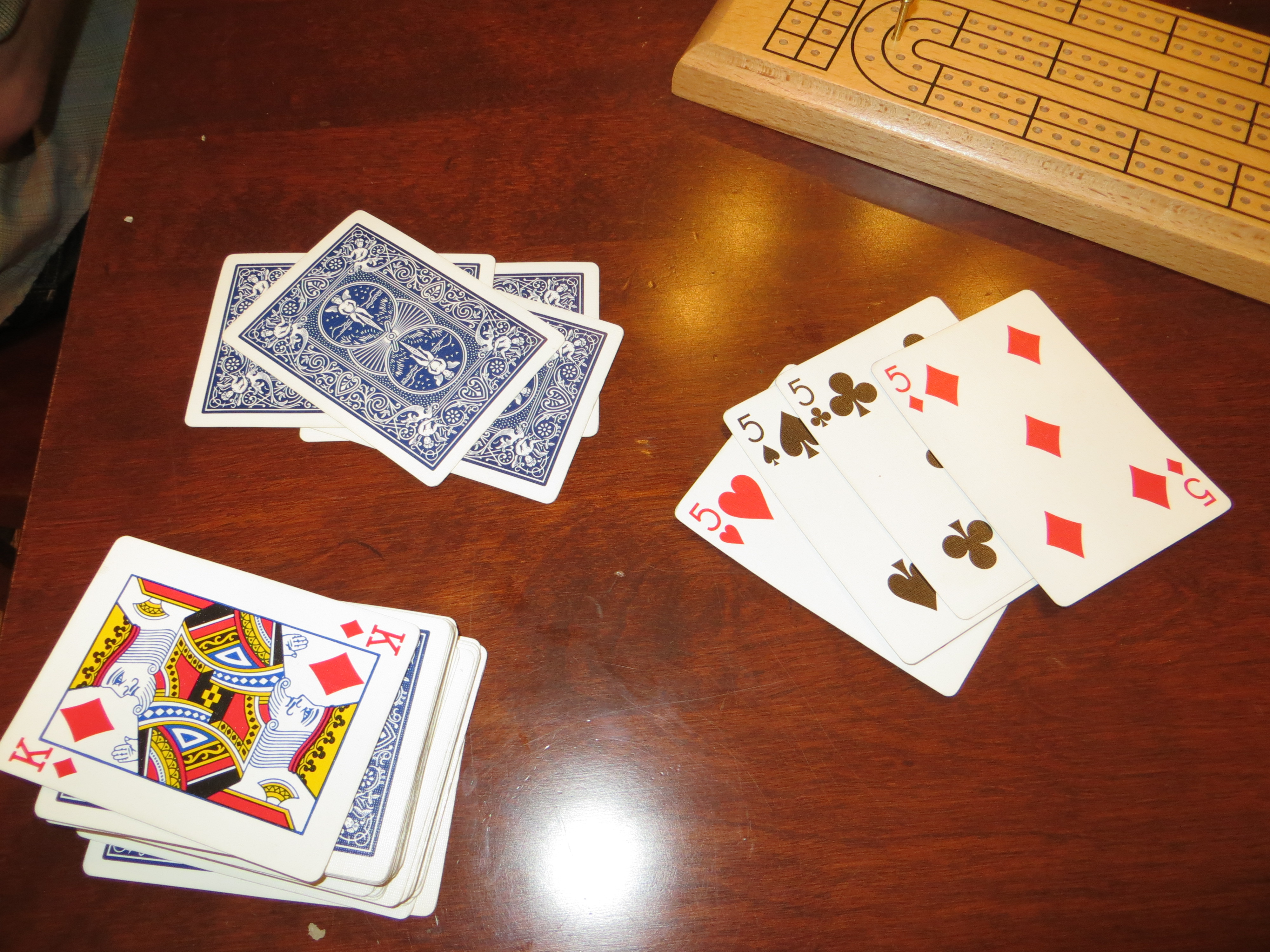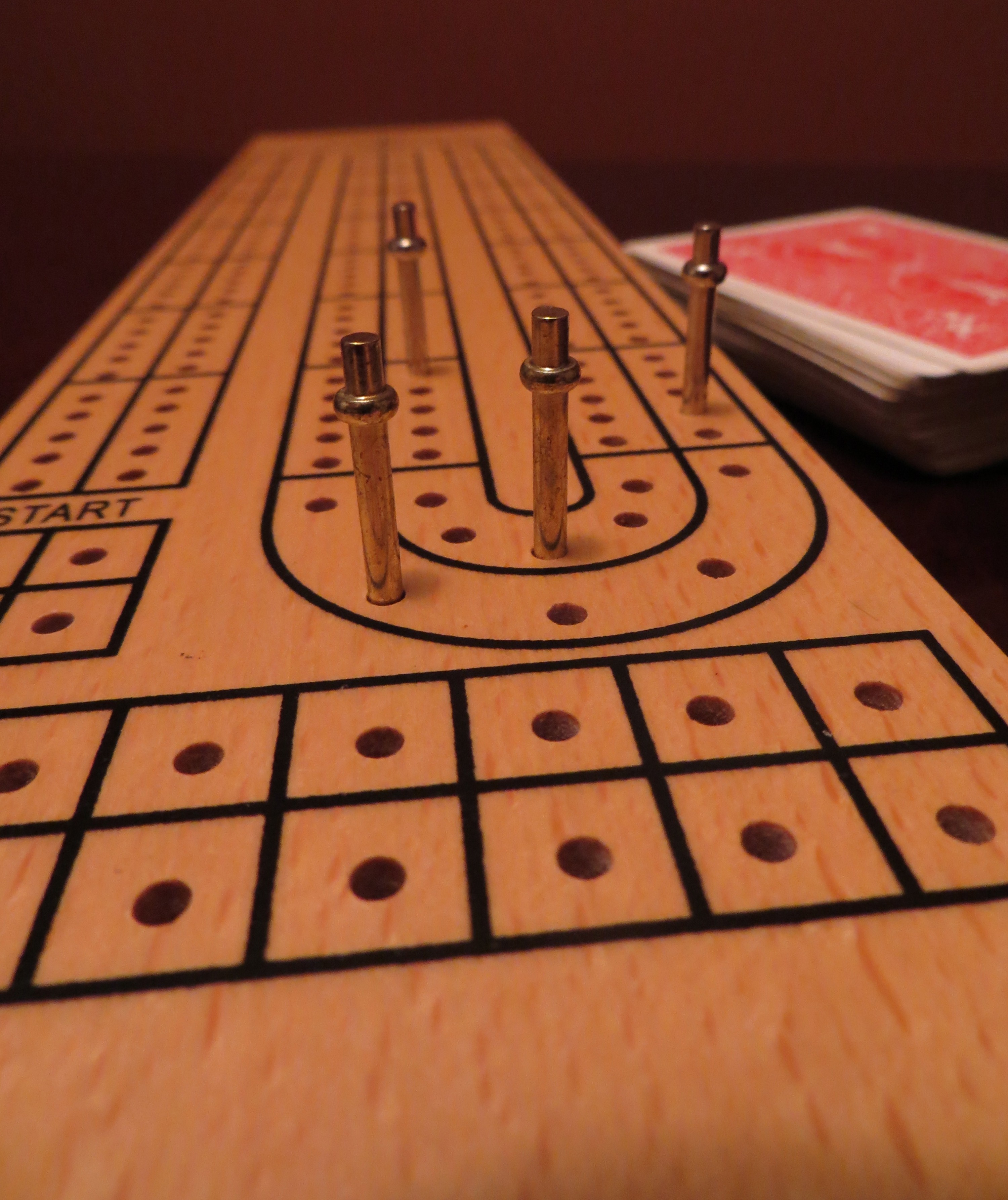
The other day we were talking about potentially having a social event for our litigation group in Columbus, and someone mentioned that maybe we could hold a euchre tournament. The B.A. Jersey Girl commented, however, that we would have to actually teach the game to some of our lawyers. This astonished me, because I thought that this fun and fast-paced card game was played by pretty much everyone who has ever touched a deck of cards. To the contrary, the B.A.J.G. inexorably maintained: euchre is virtually unknown on her home turf or elsewhere along the east coast, and seemed to be played only in Ohio and perhaps other parts of the Midwest.
Sadly, in this, as in so many things, the B.A.J.G proved to be correct. In America, euchre evidently is widely known and played only in a swatch of states that may be called the “euchre belt”: Pennsylvania, Kentucky, Ohio, Michigan, Indiana, and Illinois. The American version of the game apparently is derived from an Alsatian game called Juckerspiel and was brought to the U.S. by German-speaking immigrants, who handed it down to succeeding generations. That explains why the above-noted swath of the Midwest, where many German immigrants settled, is home to many euchre enthusiasts.
In Ohio, though, euchre soon expanded out of the German immigrant community. When I was a kid, all of the relatives on both sides of my family played euchre (as well as pretty much every other card game), and when I was in high school I and other classmates at Upper Arlington High School often played euchre in the “student center” during break periods between scheduled classes. (It beat studying in the “learning center.”) It was a quick, raucous game that well-suited to being completed within an open period.
The rules of euchre are weird, which is part of the fun of the game–and which makes you wonder what long-forgotten savant came up with them. Among other oddities, you begin by culling the deck itself and getting rid of all of the cards except the nines, tens, jacks, queens, kings, and aces. A euchre game is four-handed, with a player teaming up with the person facing them at the table. Each player is dealt five cards (in two rounds, for no readily apparent reason), and the remaining four cards are placed in a pile face down on the table before the top card is flipped over. This is a crucial element of the game, because the three down cards in the “kitty,” which could be crucial to the hand, are instead “buried” and their identity is unknown to the players. Many euchre players have come a cropper, or lucked out on a weak hand, because of the identity of these down cards.
The players determine a suit first by going around the table so that each player decides whether to “order up” the top card that has been turned over from the kitty, in which case the dealer of the hand takes the card, puts it in his hand, and selects a discard from his hand to join the down cards in the kitty. (This is another key part of the game, where you try to signal your partner about your hand–perhaps by a long pause as if you are debating whether you’ve got enough to order up the card, only to ultimately decide not to do so.) If no one orders it up, the top card is turned down and another round occurs in which any player may name the trump suit. Whichever team names the trump then has to win three of the five tricks, and if they fail they are “euchred.” If you’ve got a very strong hand and you’ve named the trump, you’ve also got to decide whether to “got it alone” and hope you can win all five tricks by yourself–and not get euchred in the process.
The card priority rules of euchre are even stranger. When trump is named, the two most highest ranked cards are the “bowers”–the jack of the trump suit (the all-powerful “right” bower) and the jack of the other suit of the same color (the “left” bower, which can take any card but the right bower). So, if hearts is the trump, the jack of hearts is the right bower, and the jack of diamonds is the left bower. “Bowers” apparently are the Americanized version of “bauers,” which is German for farmers. Players must follow the suit that is led, but if their hand has a void (i.e., no cards of the suit led) they can try to take the trick with a trump. With every player holding only five cards, voids are common, and unexpected trump plays that take an off ace can ruin the best hands.
I can’t summarize all of the rules of this great game, in which hands are over in the blink of an eye. taunting is commonplace, and friendly arguments about card-playing decisions are inevitable, but if you’re not familiar with euchre, I encourage you to learn it. You can check out a “beginner’s guide” to the game here.
I’m hoping we go forward with that euchre tournament. It would be nice to see the “euchre belt” widened and lengthened.


 There are some crucial requirements for these brainstarters and timewasters. First, they need to be sufficiently interesting to actually get your brain working and allow you to fill the time you’re looking to occupy. If the app is so boring that you lose interest and would rather sit there drumming your finders on the arm of your chair, it has failed in its essential function. Second, at the same time the app can’t be so riveting that you can’t promptly stop when your spouse comes downstairs and is ready to go and would be offended if you gave her the one-minute sign and kept tapping your phone. It therefore needs to be a game, or puzzle, or challenge that you can readily put down and pick up again at your leisure, And third, if the app is going to have staying power on your phone, it’s got to be set up so that you’re always facing a new challenge.
There are some crucial requirements for these brainstarters and timewasters. First, they need to be sufficiently interesting to actually get your brain working and allow you to fill the time you’re looking to occupy. If the app is so boring that you lose interest and would rather sit there drumming your finders on the arm of your chair, it has failed in its essential function. Second, at the same time the app can’t be so riveting that you can’t promptly stop when your spouse comes downstairs and is ready to go and would be offended if you gave her the one-minute sign and kept tapping your phone. It therefore needs to be a game, or puzzle, or challenge that you can readily put down and pick up again at your leisure, And third, if the app is going to have staying power on your phone, it’s got to be set up so that you’re always facing a new challenge.
 The key point in the game was Francona’s decision to go to his bullpen in the fifth inning. It was a ballsy move that could have blown up in Francona’s face — but it didn’t. Yes, lefty Andrew Miller had to pitch more than normal, but the bullpen held the lead, Cody Allen closed the door for the save, and the Tribe has a leg up.
The key point in the game was Francona’s decision to go to his bullpen in the fifth inning. It was a ballsy move that could have blown up in Francona’s face — but it didn’t. Yes, lefty Andrew Miller had to pitch more than normal, but the bullpen held the lead, Cody Allen closed the door for the save, and the Tribe has a leg up. Euchre is a great game for that setting, because each player is dealt only five cards. As a result, every hand is over quickly, so if you get a crappy hand — which unfortunately happens from time to time — it’s only a matter of a few minutes before you get a new one that hopefully isn’t filled with nines and tens. And there’s never a gap in table talk, either, because each hand offers opportunities to chat about the cards, the hand just played, the lay-down loner you didn’t get to call, and your run of ridiculous, inexplicable bad luck.
Euchre is a great game for that setting, because each player is dealt only five cards. As a result, every hand is over quickly, so if you get a crappy hand — which unfortunately happens from time to time — it’s only a matter of a few minutes before you get a new one that hopefully isn’t filled with nines and tens. And there’s never a gap in table talk, either, because each hand offers opportunities to chat about the cards, the hand just played, the lay-down loner you didn’t get to call, and your run of ridiculous, inexplicable bad luck.


 The casino alleges that the gambler used a method called “edge sorting” that took advantage of defective cards with patterns on the backs that were not uniform. The lawsuit claims that the gambler noticed the defect and got the dealer to arrange and shuffle the cards in a way that allowed him to use the non-uniform patterns to identify which cards were coming out of the dealer’s shoe.
The casino alleges that the gambler used a method called “edge sorting” that took advantage of defective cards with patterns on the backs that were not uniform. The lawsuit claims that the gambler noticed the defect and got the dealer to arrange and shuffle the cards in a way that allowed him to use the non-uniform patterns to identify which cards were coming out of the dealer’s shoe. 



